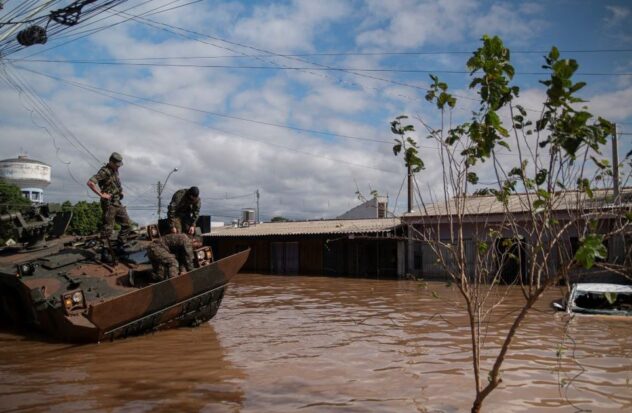SÃO PAULO.- The Brazilian authorities reported that there are 162 fatalities after the devastating floods in the state of Rio Grande do Sul. Since the beginning of May, this situation has left 75 people missing, representing “the greatest challenge in history” for the state.
According to the Civil Defense of Rio Grande do Sul, more than 581,000 people have lost their homes, with nearly 70,000 refugees in state shelters. The state issued a new alert for heavy rains.
The unprecedented rainfall has flooded almost the entire state, affecting 2.3 million people and leaving more than 800 injured. A total of 467 of the 497 municipalities have been hit by the rains, according to Agencia Brasil.
Carlos Hundredmarker, general director of the Municipal Cleaning Department, called the disaster “the biggest challenge in history” for his department. “We have not been able to calculate how many tons of waste we will have to remove,” he said on the G1 news portal.
The disaster affected more than 80% of the state’s municipalities and damaged critical infrastructure. More than 3,000 health facilities, including hospitals, pharmacies and clinics, were damaged, according to a report by Fiocruz, a health research institute.
First deaths from diseases
On Wednesday, Brazilian authorities reported the first deaths caused by a waterborne bacterial disease in southern Brazil, as flooding gradually subsides. More fatalities are expected.
The Ministry of Health of Rio Grande do Sul confirmed the death of two men, aged 33 years and 67 years, respectively, from leptospirosis, at the beginning of the week. Since May, the state has recorded 26 cases of leptospirosis.
Health experts had predicted an increase in infectious diseases such as leptospirosis and hepatitis B after the floods, due to the mixing of sewage with flood water.
“The aftermath of flooding can be deadly,” said Paulo Saldiva, a professor of medicine at the University of Sao Paulo who researches the impact of climate change on public health. “The lack of drinking water will force people to use pond water, which is not of good quality.”
Carlos Machado, public health and environmental expert at Fiocruz, indicated that the leptospirosis outbreak was expected due to the number of people exposed to water. “We have never seen a disaster of this magnitude in Brazil with such a large population exposed,” he said.
Machado added that, despite the damage to the infrastructure, the local department’s health and control services are working on the prevention of infectious diseases and guiding people returning home on how to reduce the risks of exposure.
The interruption of health services can also affect patients with chronic diseases, by stopping their treatments and care. “The health department is making efforts to guarantee medication to patients with chronic diseases,” concluded Machado.
Source: With information from APy AFP

